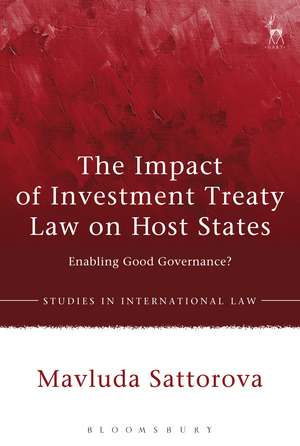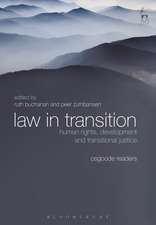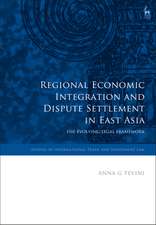The Impact of Investment Treaty Law on Host States: Enabling Good Governance?: Studies in International Law
Autor Dr Mavluda Sattorovaen Limba Engleză Hardback – 7 feb 2018
| Toate formatele și edițiile | Preț | Express |
|---|---|---|
| Paperback (1) | 237.10 lei 6-8 săpt. | |
| Bloomsbury Publishing – 24 iun 2020 | 237.10 lei 6-8 săpt. | |
| Hardback (1) | 540.38 lei 6-8 săpt. | |
| Bloomsbury Publishing – 7 feb 2018 | 540.38 lei 6-8 săpt. |
Din seria Studies in International Law
- 34%
 Preț: 511.07 lei
Preț: 511.07 lei - 30%
 Preț: 538.77 lei
Preț: 538.77 lei - 23%
 Preț: 249.26 lei
Preț: 249.26 lei - 34%
 Preț: 512.30 lei
Preț: 512.30 lei - 21%
 Preț: 275.26 lei
Preț: 275.26 lei - 30%
 Preț: 570.51 lei
Preț: 570.51 lei - 30%
 Preț: 571.24 lei
Preț: 571.24 lei - 30%
 Preț: 598.45 lei
Preț: 598.45 lei - 18%
 Preț: 297.20 lei
Preț: 297.20 lei - 30%
 Preț: 573.05 lei
Preț: 573.05 lei - 30%
 Preț: 1138.79 lei
Preț: 1138.79 lei -
 Preț: 448.39 lei
Preț: 448.39 lei - 30%
 Preț: 571.34 lei
Preț: 571.34 lei - 28%
 Preț: 406.31 lei
Preț: 406.31 lei - 21%
 Preț: 270.97 lei
Preț: 270.97 lei - 30%
 Preț: 570.43 lei
Preț: 570.43 lei - 30%
 Preț: 836.82 lei
Preț: 836.82 lei - 14%
 Preț: 570.43 lei
Preț: 570.43 lei - 30%
 Preț: 512.37 lei
Preț: 512.37 lei - 30%
 Preț: 511.14 lei
Preț: 511.14 lei - 30%
 Preț: 954.11 lei
Preț: 954.11 lei - 30%
 Preț: 572.47 lei
Preț: 572.47 lei - 30%
 Preț: 603.73 lei
Preț: 603.73 lei - 30%
 Preț: 779.50 lei
Preț: 779.50 lei - 14%
 Preț: 837.54 lei
Preț: 837.54 lei - 30%
 Preț: 898.78 lei
Preț: 898.78 lei - 30%
 Preț: 576.40 lei
Preț: 576.40 lei - 30%
 Preț: 719.91 lei
Preț: 719.91 lei - 30%
 Preț: 599.66 lei
Preț: 599.66 lei - 12%
 Preț: 233.46 lei
Preț: 233.46 lei - 30%
 Preț: 779.50 lei
Preț: 779.50 lei - 30%
 Preț: 570.43 lei
Preț: 570.43 lei - 14%
 Preț: 779.09 lei
Preț: 779.09 lei - 30%
 Preț: 573.86 lei
Preț: 573.86 lei - 14%
 Preț: 574.92 lei
Preț: 574.92 lei - 28%
 Preț: 500.25 lei
Preț: 500.25 lei - 30%
 Preț: 542.02 lei
Preț: 542.02 lei - 30%
 Preț: 778.12 lei
Preț: 778.12 lei - 30%
 Preț: 540.48 lei
Preț: 540.48 lei - 30%
 Preț: 570.43 lei
Preț: 570.43 lei - 30%
 Preț: 515.24 lei
Preț: 515.24 lei - 30%
 Preț: 573.70 lei
Preț: 573.70 lei - 30%
 Preț: 720.23 lei
Preț: 720.23 lei - 30%
 Preț: 784.00 lei
Preț: 784.00 lei - 22%
 Preț: 571.24 lei
Preț: 571.24 lei - 14%
 Preț: 779.09 lei
Preț: 779.09 lei - 30%
 Preț: 779.91 lei
Preț: 779.91 lei
Preț: 540.38 lei
Preț vechi: 774.04 lei
-30% Nou
Puncte Express: 811
Preț estimativ în valută:
103.42€ • 107.57$ • 85.37£
103.42€ • 107.57$ • 85.37£
Carte tipărită la comandă
Livrare economică 14-28 aprilie
Preluare comenzi: 021 569.72.76
Specificații
ISBN-13: 9781849465854
ISBN-10: 1849465851
Pagini: 232
Dimensiuni: 156 x 234 x 14 mm
Greutate: 0.54 kg
Editura: Bloomsbury Publishing
Colecția Hart Publishing
Seria Studies in International Law
Locul publicării:London, United Kingdom
ISBN-10: 1849465851
Pagini: 232
Dimensiuni: 156 x 234 x 14 mm
Greutate: 0.54 kg
Editura: Bloomsbury Publishing
Colecția Hart Publishing
Seria Studies in International Law
Locul publicării:London, United Kingdom
Caracteristici
The author takes a comparative approach to examine the rule of law and regulatory compliance initiatives undertaken by the World Bank and the European Union.
Notă biografică
Dr Mavluda Sattorova is Senior Lecturer at the School of Law and Social Justice, University of Liverpool.
Cuprins
1. Introduction I. International Investment Law: From Good Governance for Foreign Investors to Good Governance for AllII. Conceptual Framework III. Outline of Chapters2. Genesis of 'Good Governance' Narratives in International Investment Law and Scholarship: An Historical and Doctrinal Analysis I. Conceptual Inspirations behind the Good Governance Narratives of Investment Treaty Law II. Embodiments of Good Governance Precepts in Investment Treaty Law III. Competing Visions of Investment Treaty Law and its Good Governance Promise IV. Conclusion 3. How Do Host States Respond to Investment Treaty Law? I. The Impact of Investment Treaty Law on Governance in Host States: Key Empirical Questions II. Methodology III. Are Government Officials Aware of International Investment Law and its Good Governance Prescriptions? IV. How Host States 'Learn' from Investment Arbitration V. Negative Internalisation: Over-protection and Withdrawal VI. Internalising Investment Treaty Prescriptions: Why, at Whose Behest and What Cost?VII. Conclusion 4. The Role of Remedy Design in Inducing Host States to Comply with Investment Treaty Standards of Good Governance I. Damages as a Principal Form of Relief for an Investment Treaty Breach II. Can State Compliance with Good Governance Standards be Fostered through Monetary Sanctions? III. The Design of Investment Treaty Remedies and State Compliance with Good Governance Standards:A Functional Analysis IV. Compliance and Optimal Remedy Design: Punitive, Non-pecuniary, Multi-tiered? V. Conclusion 5. Investment Treaty Law and its Internal Capacity to Foster Good Governance in Host States I. Is the Investment Treaty Regime Compliant with Good Governance Standards? II. Legitimacy and 'Compliance Pull': (Insufficient) Transparency and Coherence of Investment Treaty Rulesand Arbitral Jurisprudence III. Internationalisation of Investment Law and its (Disempowering) Effects on Governance in Host States IV. Good Governance as a Two-way Street: Dealing with Investor Misconduct in Treaty Practice and Arbitration V. Conclusion 6. International Investment Law and its Anti-participatory Animus I. The Investment Treaty Regime and Its Disregard for the Political and Social Interfaces of Development II. Foreign Investors and the Domestic Political Process III. Developing Countries and the Making of International Investment Law: Lack of Participation and Inclusivity IV. Lack of Stakeholder Input in the Making of Investment Treaties in Developed Countries V. Conclusion 7. Conclusion
Recenzii
Sattorova's book is a comprehensive contribution that can serve those approaching the topic from radically different angles.... likely to find its place on many bookshelves - and rightfully so.
An ingenious author has burst the bubble surrounding a central yet unexamined assumption in international investment law. Some of the most prolific promoters of the regime ... maintain that investment law has the beneficial effect of promoting standards of good governance associated with such things as transparency, predictability, and stability... By empirically investigating this claim in The Impact of Investment Treaty Law on Host States, Mavluda Sattorova has made an immensely important contribution.
[T]he book offers interesting empirical insights into the perception of government officials of their own state's commitments under investment treaties, and how this communication or lack thereof between governmental agencies, on the one hand, and those who conclude the treaties, on the other, is likely to be a phenomenon that is observed both in developing and developed states, perhaps to different degrees, but present in both nonetheless.
In this excellent and perceptive new book, Sattorova presents a well-argued and robustly researched critique of one of the dominant strains of thought in the academic literature on international investment treaties: the notion that in imposing legally enforceable obligations on host states, such instruments work to develop "good governance" practices in developing countries, providing tangible benefits on top of the financial contribution of the foreign capital itself.
[A] very thought-provoking contribution and a rare empirical-based study on the current "legitimacy" debates, challenging the traditional good governance narrative of international investment law.
An ingenious author has burst the bubble surrounding a central yet unexamined assumption in international investment law. Some of the most prolific promoters of the regime ... maintain that investment law has the beneficial effect of promoting standards of good governance associated with such things as transparency, predictability, and stability... By empirically investigating this claim in The Impact of Investment Treaty Law on Host States, Mavluda Sattorova has made an immensely important contribution.
[T]he book offers interesting empirical insights into the perception of government officials of their own state's commitments under investment treaties, and how this communication or lack thereof between governmental agencies, on the one hand, and those who conclude the treaties, on the other, is likely to be a phenomenon that is observed both in developing and developed states, perhaps to different degrees, but present in both nonetheless.
In this excellent and perceptive new book, Sattorova presents a well-argued and robustly researched critique of one of the dominant strains of thought in the academic literature on international investment treaties: the notion that in imposing legally enforceable obligations on host states, such instruments work to develop "good governance" practices in developing countries, providing tangible benefits on top of the financial contribution of the foreign capital itself.
[A] very thought-provoking contribution and a rare empirical-based study on the current "legitimacy" debates, challenging the traditional good governance narrative of international investment law.





















